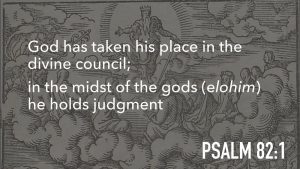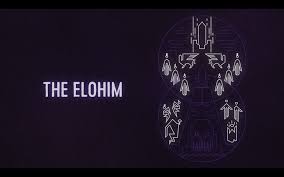
Shownotes
Welcome to Day 1446 of our Wisdom-Trek, and thank you for joining me.
I am Guthrie Chamberlain, Your Guide to Wisdom
Divine Council - Overcoming Objections – Worldview Wednesday
Wisdom - the final frontier to true knowledge. Welcome to Wisdom-Trek! Where our mission is to create a legacy of wisdom, to seek out discernment and insights, to boldly grow where few have chosen to grow before. Hello, my friend, I am Guthrie Chamberlain, your captain on our journey to increase Wisdom and Create a Living Legacy. Thank you for joining us today as we explore wisdom on our 2nd millennium of podcasts. Today is Day 1446 of our Trek, and it is Worldview Wednesday. Creating a Biblical Worldview is essential to have a proper perspective on today’s current events. To establish a Biblical Worldview, you must have a proper understanding of God and His Word. This week, on our Worldview Wednesday episode, we will continue with our study based on a course I recently completed taught by Dr. Michael Heiser. Our study is titled “Sons and Daughters of God: The Believer’s Identity, Calling, and Destiny” Throughout this multi-week course we will demonstrate that, in the Old Testament, “sons of God” and “holy ones” refers to supernatural beings whose Father is God and who work with God to carry out His will and that this divine family was present before humanity. By fully engaging with biblical texts such as Psalm 82; Psalm 89, and Deuteronomy 32:8–9, our study will show that this divine family functions as a template for God’s human family. God desires of humans, as His imagers, to participate in His council. This study addresses issues such as polytheism, the nature of the (little ‘g’) “gods,” and the uniqueness of Yahweh. Within this study, we will apply insights to the New Testament texts and shows how the metaphor of being in God’s family informs our sense of identity and mission as believers.
Divine Council - Overcoming Objections
· Segment 7: Idols Part 2
Elohim and the Divine Council Does Not Refer to Idols
We are talking about the language of divine plurality in Psalm 82 (the plural elohim), and whether we should understand that language as referring to idols. To be honest, at this point, you’re probably wondering how this question is even relevant, how it makes any sense.
Fear of Polytheism
Well, a lot of people gravitate toward this option because they don’t want plural elohim to be real because of the fear of polytheism. We’re going to see later that that is an unsubstantial fear. Biblical theology does not teach polytheism, but we need to continue with this question because Bible teachers and even some scholars raise it.
Additional Support For a Divine Council in Daniel 7
We already saw last week in 1 Kings 22 that we have in God’s council a heavenly host of spirit beings. That makes perfect sense; they are the ones who carry out God’s decrees. In that example, it was God’s decree that Ahab was going to die. In Daniel 7, we pick up another passage. Again, keep in mind, idols don’t work for God. God does have an entourage; He does have a heavenly host; He does have a council, but we are not talking about idols here. So, in Daniel 7:9-10, we read this, Daniel says,
As I looked,
thrones were placed,
and the Ancient of Days took His seat;
his clothing was white as snow,
and the hair of his head like pure wool;
his throne was fiery flames;
its wheels were burning fire.
A stream of fire issued
and came out from before him;
a thousand thousands served him,
and ten thousand times ten thousand stood before him;
the court sat in judgment,
and the books were opened.
What we have here is a divine council meeting. We have thrones (plural) set up to render a judgment. We have a court, a council sitting, books are opened because God and His council, His entourage, His assembly, are going to render a judgment. About what? Well, if we read through the whole of Daniel 7, they are meeting to decide what is the fate of these four beasts in the vision of Daniel 7. The point for our purposes, though, is that these are not idols, and God does not work with idols.
Nebuchadnezzar’s Dream and the Divine Decrees in Daniel 4
In Daniel 4, we see something similar, except not quite as dramatic. This is the chapter in Daniel, where Nebuchadnezzar gets news that he is going to go temporarily insane. In Daniel 4:13, Nebuchadnezzar begins explaining to Daniel what happened—you know, what he saw in his vision or his dream. And we read in verse 13, “I saw in the visions of my head as I lay in bed, and behold, a watcher, a holy one, came down from heaven.”
Now, the language here is significant. “Watcher” is a word that’s used several times in Daniel and other Jewish literature for a divine being, a member of the heavenly host. He is referred to here as a “holy one.” We’ve already seen references to a council of holy ones back in Psalm 89, and so here, they are in this scene in Daniel 4.
Now, what happens is Nebuchadnezzar explains his dream, and its meaning is not good news for him. He is going to go temporarily insane. In Daniel 4:17, we read this, “The sentence is by the decree of the watchers, the decision by the word of the holy ones, to the end that the living may know that the Most High rules the kingdom of men and gives it to whom he will and sets over it the lowliest of men.”
So we have this decision about Nebuchadnezzar being judged associated with a group: “this is the decree of the watchers [plural], the decision by the word of the holy ones [plural].” Just so that we don’t misunderstand and say, “Oh, we’ve got just a rogue bunch of holy ones up there making decisions that God isn’t any part of,” Daniel 4 is going to cut that thought off pretty clearly. In Daniel 4:24, we read very similar language to verse 17; it says, “This is the interpretation, O king: It is a decree of the Highest, which has come upon my lord the king.”

Why Does God Need a Council?
Let us get to the heart of the question; what does God need with a council? So we might as well address it here. Frankly, God doesn’t need a council. He doesn’t need anything, but this is what He does. He wants it.
I think a good parallel would be to ask, “Why does God need humans? “Why does God need us as individuals? Why does God need the church? Why does God need people for evangelism, the Great Commission?” Well, the short answer is He doesn’t. God could just sort of flip switches on and off about who is going to believe and not and call it a day, but He doesn’t do that. He has humans participate with Him in something He wants to get done.
So there is no council acting without God’s approval. This is God making a decision, and the council participates with Him to carry out what God wants to happen, God’s decrees.
And this takes our mind back to in our introduction this whole idea about a template. We are learning something about how God operates in the supernatural world with His divine family. His divine bureaucracy. His divine council. Understanding how God works with His divine family is going to help inform us about how God looks at our participation as humans. God has tasks that He wants His earthly family to participate in. He has responsibilities for us. So God doesn’t need a council; He doesn’t need us either. This is just how He works.
Summary
So back to our main thought at this juncture: we’re not dealing with idols. Idols are enemies of God. They are objects in which fallen; rebellious, hostile, divine beings were thought to reside. This council of Yahweh is in the skies; it’s in the heavens. It’s not on earth where idols are, and idols are hostile anyway.
Now, the implication here I think we’ve seen very clearly is we have a participatory sort of relationship between God and the members of His family. He allows genuine participation in carrying out His will. A sub-thought of that is the notion that, well, if He is allowing genuine participation, what about predestination? Isn’t everything predetermined anyway? And we’re going to discover in future lessons that no, that isn’t the case.[1]
That will conclude segment 7 in our study, “Sons and Daughters of God: The Believers Identity, Calling, and Destiny.” Join us again next week as we explore Shared Rule with the Heavenly Council. I believe you will find each Worldview Wednesday contains thought-provoking topics to consider as we build our Biblical Worldview.
Tomorrow we will continue with our 3-minute Humor nugget that will provide you with a bit of cheer, which will help you to lighten up and live a rich and satisfying life. So encourage your friends and family to join us and then come along with us tomorrow for another day of ‘Wisdom-Trek, Creating a Legacy.’ If you would like to listen to any of our past 1445 treks or read the Wisdom Journal, they are available at Wisdom-Trek.com. I encourage you to subscribe to Wisdom-Trek on your favorite podcast player so that each day’s trek will be downloaded automatically.
If you would like to listen to any of our past 1445 treks or read the Wisdom Journal, they are available at Wisdom-Trek.com. I encourage you to subscribe to Wisdom-Trek on your favorite podcast player so that each day’s trek will be downloaded automatically.
Thank you so much for allowing me to be your guide, mentor, and, most of all, your friend as I serve you in through this Wisdom-Trek podcast and journal.
As we take this Trek together, let us always:
- Live Abundantly (Fully)
- Love Unconditionally
- Listen Intentionally
- Learn Continuously
- Lend to others Generously
- Lead with Integrity
- Leave a Living Legacy Each Day
I am Guthrie Chamberlain….reminding you to ’Keep Moving Forward,’ ‘Enjoy your Journey,’ and ‘Create a Great Day…Everyday’! See you Tomorrow!
[1] Heiser, M. S. (2019). Sons and Daughters of God: The Believer’s Identity, Calling, and Destiny. Bellingham, WA: Lexham Press.